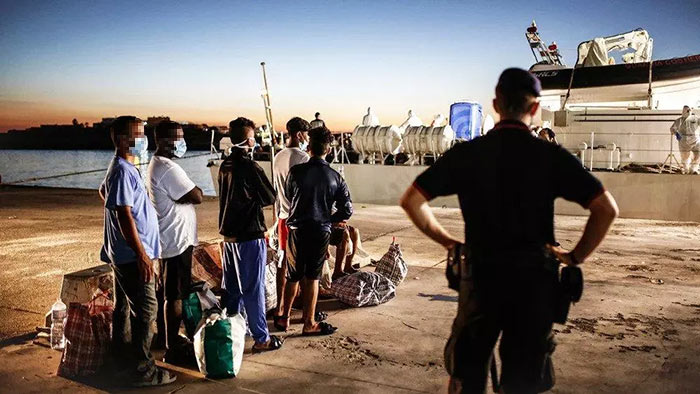Britain to send Sri Lankan asylum seekers to Rwanda for medical treatment

(Sara Creta / TNH)
Three Sri Lankan asylum seekers stranded on Diego Garcia, a remote island in the British Indian Ocean Territory, or BIOT, are expected to be transported to Rwanda for medical treatment, the British foreign office told The New Humanitarian.
More than 200 Sri Lankan asylum seekers, mostly ethnic Tamils claiming to have faced persecution in Sri Lanka, arrived on Diego Garcia in five successive boats starting in October 2021. Dozens have since returned to Sri Lanka on flights arranged by BIOT authorities, while others have returned to their boats and sailed farther across the Indian Ocean to Réunion Island, the French overseas department.
Confirming news of the medical move in an emailed response to The New Humanitarian, the UK Foreign, Commonwealth and Development Office said the “migrants” would be returned to BIOT after their treatment was complete.
The medical transfers are adding to fears that British authorities could seek to deport the Sri Lankan asylum seekers to Rwanda under an offshore processing deal then-prime minister Boris Johnson concluded with the Rwandan government in April.
Deportations from mainland Britain under the Rwanda deal – after arrivals on boats from France surpassed 40,000 in 2022, up more than 10,000 from 2021 – have been stalled for months amid challenges by UK courts, as well as the refusal of several airlines to carry out the removals.
More than 100 asylum seekers remain on Diego Garcia, waiting for BIOT authorities to determine whether they can be repatriated to Sri Lanka without violating the international legal principle of non-refoulement, which precludes them being sent to unsafe countries.
“One thing that worries me is that this could be the precursor to the Rwanda plan,” said Janahan Sivanathan, a paralegal at the Joint Council for the Welfare of Immigrants, which is providing pro bono legal services to some of the asylum seekers during interviews to determine their international protection needs.
“They have this migration deal that they spent millions and millions on, but they are unable to send anyone from the UK,” Sivanathan said, adding that the same challenges do not exist on BIOT as the territory is exempt from the UK’s international human rights treaties and has its own military aircraft.
“So [the government] can actually use that as a precursor, as an example, to show, ‘we did this’. There’s nothing to prevent them at all,” he said.
BIOT authorities have informed the asylum seekers that none will be permitted to claim asylum in the UK; those determined unable to return safely to Sri Lanka will be sent to unspecified “third countries“.
“Many [asylum seekers] say this ‘third country’ is Rwanda,” said Meera*, a Sri Lankan mother of three whose husband was among the first asylum seekers to arrive on Diego Garcia in October 2021.
“[My husband] doesn’t want an unsafe country like Rwanda and wants to go to a good, safe country. Is there anything that can be done to stop this fate before making such a decision?” she told The New Humanitarian via WhatsApp.
“Hearing the name Rwanda, I don’t even know – is that a country? Is it even habitable?” said Kannan*, an asylum seeker in his 20s who spoke to The New Humanitarian via video call from Diego Garcia.
Sivanathan said his organisation had received no information about the medical trip to Rwanda from BIOT authorities, and one of their clients was only informed on 14 November that the flight was scheduled for the following day.
He also said at least 21 asylum seekers had their applications for international protection rejected, meaning BIOT authorities determined they could legally be deported to Sri Lanka. Ten have volunteered to return rather than challenge the decision via judicial review.
“Overall, I can say that they have not been given an adequate opportunity to present their cases in full,” Sivanathan said. “Their representations have been limited due to funds not being available, and all the services expected by the BIOT are on a pro bono basis, with very limited means of communication.”
Kannan, who alleged being tortured by Sri Lankan government forces before leaving the country last year, said: “I would never return to Sri Lanka. I will take a journey on the sea instead.”
The medical transfer move comes amid heightened pressure on the UK government over migrant and asylum seeker arrivals. On 14 November, Home Secretary Suella Braverman signed a deal with the French government to boost the number of patrol boats in the English Channel. Earlier this month, the day after an immigration centre near England’s southeastern coast was bombed by a far-right attacker, Braverman described boat arrivals of asylum seekers as an “invasion”. She has also said it is her “dream” and “obsession” to see asylum seekers deported to Rwanda.
(Source: The New Humanitarian)
Latest Headlines in Sri Lanka
- Arjuna Ranatunga, brother indicted over CEYPETCO loss January 22, 2026
- GMOA announces 48 hour nationwide hospital strike January 22, 2026
- Nuwara Eliya records 3.5°C as Sri Lanka sees sharp temperature drop January 22, 2026
- CEB trade unions warn of action from February 01 over unresolved issues January 22, 2026
- IMF delegation arrives in Sri Lanka to assess Cyclone Ditwa impact January 22, 2026


